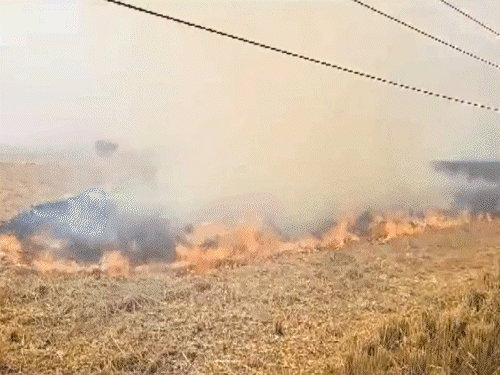Incidents of stubble burning have decreased by 50% in four years, but the problem persists. According to the CAQM, 87,632 cases were recorded in 2020, while in 2023 this figure fell to 39,186.
The Delhi pollution case was heard by the Supreme Court on Friday. The court reprimanded the Commission for Air Quality Management (CAQM) for failing to take effective measures against stubble burning.
The court declared that an emergency situation existed due to the pollution. Asked CAQM if there has been a reduction in stubble burning? Why are you not taking effective measures against stubble burning? Why aren’t meetings held all the time? Your action is only on paper and you are a mute spectator.
If you do not make it known that strict action will be taken in case of violation of the law, these provisions will only remain on paper.
During the last hearing on August 27, the court had said that the Delhi-NCR Pollution Control Board was not functioning properly due to reduced staff.
The court had ordered five states to fill up the vacancies by April 30, 2025, so that pollution could be controlled.
The case is being heard by Justice Abhay S Oka and Justice AG Masih.
CAQM response: more than 10,000 factories are asked to close CAQM president Rajesh Verma said that after forming the committee, it had issued 82 legal orders and 15 suggestions. His team inspected 19,000 locations and ordered the closure of more than 10,000 factories.
On this subject, the Court declared that the CAQM has existed for three years, but that it has only issued 82 instructions. So many actions are not enough. The Commission must be more active. The Commission should check whether its instructions reduce the pollution problem or not.
In fact, the central government had established the CAQM in 2021. It was designed to deal with the problem of increasing pollution in and around Delhi-NCR.
The court said: everything is pending Additional Solicitor General (ASG) Aishwarya Bhati read out the affidavit on behalf of the Center in the Supreme Court. In it, information was given on measures such as issuing advisories and guidelines to deal with the stubble crisis. But the court seemed unhappy with these efforts. Judge Oka said: “Everything is pending. We have not been told anything about what has been done in the NCR states.
Pollution in Delhi, Supreme Court reprimands 3 governments In November last year, the Supreme Court had asked the Delhi and Punjab governments what steps they were taking to end the pollution problem.
Along with this, the Supreme Court showed sympathy towards the farmers of Punjab. The court said that farmers who burn stubble have become villains. Nobody listens to their point of view. Farmers must have reasons to burn stubble.
The Punjab government should provide them with assistance to prevent them from stubble burning. The court had reprimanded the governments of Delhi, Punjab and Uttar Pradesh and said: “This November has been the most polluted in the last six years. We know the problem and it is your job to resolve it.
The court told the governments of Delhi, Punjab and Uttar Pradesh that it was their responsibility to find a solution to the pollution problem.
The court said the AAP governments in Delhi and Punjab should take steps to stop the pollution. The bench comprising Justices SK Kaul and S Dhulia asked the Punjab and Delhi governments to take strict action against stubble burning, which increases pollution in Delhi.
This is not the first time that the Supreme Court has raised the issue that farmers are being blamed on all sides in a pollution case, but their point of view is not presented in the hearing. The court also said that the Punjab government should provide assistance to farmers to prevent them from stubble burning. The Punjab government should learn from the Haryana government.
This is not the first time that the Supreme Court has raised the issue that farmers are being blamed on all sides for pollution.
Punjab government tells court: Rs 2 crore fine for those burning stubble During the hearing, the Punjab Attorney General said that we have registered 1,000 FIRs on stubble burning and imposed a fine of Rs 2 crore. We put out the stubble fire, but people take to the streets to protest.
The attorney general said people taking to the streets is a problem. This is a public order situation. We put out the fire even at midnight. Strict measures will be taken from the start of the next season. After hearing the parties, the Supreme Court fixed the next hearing of the case for December 7.
Now know why the Supreme Court said – learn from Haryana An ex situ stubble management policy has been implemented in Haryana. In this context, crop residues are removed from the field and managed ex situ. Every year, around 30 lakh tonnes of paddy straw are produced in Haryana. Under this policy, electricity, biogas, bio-CNG, biomanure, biofuel and ethanol are made from rice straw. Farmers receive subsidies to purchase agricultural equipment and machinery to cut, collect, bale, store paddy straw and transport it to straw production industries and factories.
Also read this news…
Supreme Court says – Our bulldozer won’t stop if it starts, said on pollution in Delhi – Patience is running out
The air quality in Delhi becomes very poor every year during the winter season.
A hearing was held on November 7 before the Supreme Court on the issue of growing pollution in Delhi-NCR. During this period, Justice Sanjay Kishan Kaul issued strict orders to the governments of Punjab, Haryana, UP and Rajasthan to immediately stop stubble burning. Faced with pollution, our patience is running out; if we act, our bulldozer will not stop.

